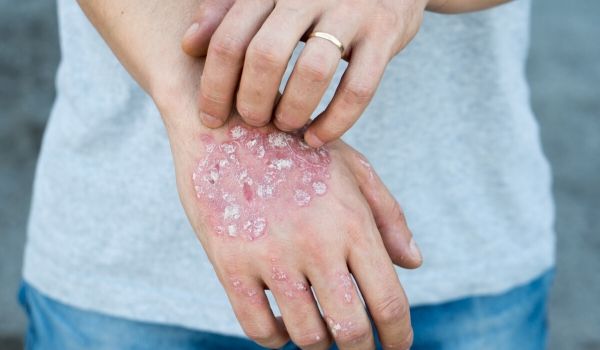What is psoriasis? Good question. Psoriasis is a skin condition that affects of 4.5 million people in the United States. We’ll discuss everything you need to know about this condition, including the types of psoriasis, how it can affect you, and treatment options. Let’s dive in.
What is Psoriasis?
Psoriasis is a skin disorder that causes skin cells to multiply 10 times faster than necessary. This build up causes the bumpy red patches with scaly white skin that commonly identifies psoriasis. Although psoriasis can appear on any part of the body, it most commonly affects the scalp, elbows, knees, and lower back. In severe cases psoriasis can cover large areas of the body. For most people however, it only affects small areas.
It’s important to know that psoriasis is not contagious but can be diagnosed in multiple people of the same family. This condition typically occurs in adulthood. Patches can often heal and disappear but can pop back up throughout your life.
Different Types of Psoriasis
There are many types of psoriasis, including:
- Erythrodermic psoriasis – This is characterized by fiery red skin and sheets of skin being shed at one time. It is often caused by sunburns, infections, certain medications, and even stopping your prescribed psoriasis treatment. If erythrodermic psoriasis occurs, seek treatment immediately as it could cause severe illness.
- Guttate psoriasis – This type of psoriasis often begins in childhood or young adulthood. Small red spots can appear on the torso and limbs. Guttate psoriasis can be triggered by any of the following: strep throat, tonsillitis, injury to the skin, stress, respiratory infections, or antimalarial or beta-blocker medications.
- Inverse psoriasis – Inverse psoriasis is identified by bright red, shiny lesions that appear in skin folds such as under the breasts or in the armpits.
- Plaque psoriasis – Plaque psoriasis is characterized by plaques of red skin that are often covered in silver-colored scales. These may be itchy and painful and can begin to crack and bleed. Plaque psoriasis can also affect your nails. This usually presents as discoloration and pitting but can also lead the nails crumbling or detaching from the nail bed.
- Pustular psoriasis – You may have heard of pustular acne. Pustular psoriasis looks similar as it is characterized by red and scaly skin with tiny pustules that appear on your hands and soles of your feet.
Although there are many types of psoriasis, plaque psoriasis is the most common type to occur. In addition to these symptoms, 10 – 30 % of people with psoriasis are diagnosed with psoriatic arthritis. This presents itself as pain and swelling of the joints.
What is the Cause of Psoriasis?
While there is no official cause of psoriasis, experts believe that a compromised immune system plays a part. Something within the immune system causes excess inflammation which leads to the build up of excess skin cells. In addition to this, certain things may trigger the psoriasis, causing it to worsen. These can be:
- Emotional stress
- Minimal to severe injury of the skin
- Certain medications
- Strep infections
What is Psoriasis Treatment Like?
Before you start treatment, your dermatologist will conduct a physical exam of the effected areas. To rule out a skin infection or other medical dermatology conditions, your dermatologist may conduct a biopsy. Once psoriasis is confirmed, you and your dermatologist will discuss treatment options.
Common treatments include steroid creams, moisturizers, coal tar, retinoid creams, and other creams and ointments. Treatment for moderate to severe psoriasis includes light therapy, and retinoids in pills, foam, creams, or other varieties. Your dermatologist may also prescribe methotrexate, enzyme inhibitors, or biologic treatments, which work to block the immune system to control the inflammation associated with psoriasis.
At Vujevich Dermatology, we offer treatment through our Psoriasis Treatment Center. Our Psoriasis Treatment Center is a state-of-the-art facility that we use to tailor psoriasis treatment to the individual. The Center offers newer treatment options, such as biologic medications and ultra-violet B light therapy, as well traditional treatment options such as oral and topical medications. Appropriate treatment can help slow the progress of psoriasis and preserve function and range of motion.
What is psoriasis like for you? Our experts will create an individualized treatment plan for your psoriasis. Vujevich Dermatology Associates offers medical, surgical, and cosmetic dermatology from some of the most highly trained physicians and clinicians in the greater Pittsburgh area. You can reach our team at 412-429-2570 or visit our contact page to see all of our locations. You can also follow us on Facebook to see what’s new in the world of dermatology.

